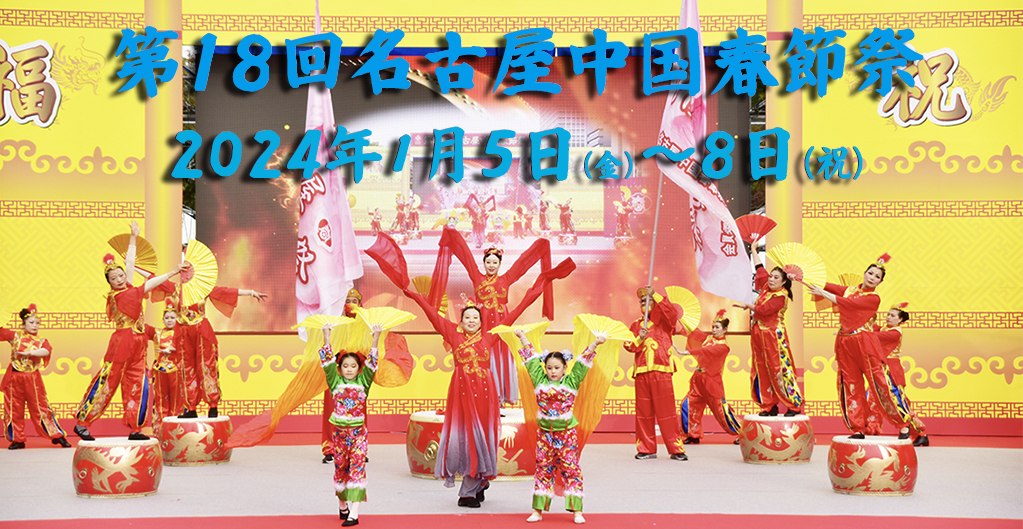Chinese New Year Festival Nagoya 2024

The 18th Nagoya China Spring Festival, scheduled in Nagoya City from January 5th to 8th, 2024, promises to be a vibrant and culturally rich event.
The festival will be held at Hisaya Odori Park’s Hisaya Square and Angel Square. This annual celebration is a significant occasion that brings together the best authentic Chinese cuisine, culture, travel, and arts, offering a unique experience for visitors.
One of the festival’s highlights is the special performance by the Suzhou Folk Orchestra, organized under the auspices of the Jiangsu Province Cultural Travel Bureau, the Consulate General of China in Nagoya, and the 18th Nagoya China Spring Festival Executive Committee. The event will feature renowned conductor Peng Jiapeng and erhu player Zhu Changyao, presenting an array of enchanting Chinese orchestral pieces such as “Holiday Overture” and “Red Dragonflies and Tangerine Blossoms.”
Moreover, the festival will blend traditional and contemporary Chinese music, including symphonies like “Guangming” and performances featuring traditional Chinese instruments. These events are crucial in promoting Sino-Japanese people-to-people exchanges and spreading the richness of Chinese culture and traditions.
In addition to musical performances, the Nagoya Spring Festival will feature traditional dragon dances, acrobatics, martial arts, Tai Chi, and ethnic dances. These performances are expected to attract large audiences from both within Japan and internationally.
The Nagoya China Spring Festival is a significant event for fostering understanding and friendship between China and Japan while providing a platform to showcase the depth and beauty of Chinese culture.
Nagoya China Spring Festival
Where: Hisaya Odori Park, 3 Chome-16 Sakae, Naka-ku (map)
When: January 5th to 8th, 2024
Website: n-cj.com
Nagoya China Spring Festival celebrates the Chinese New Year, a festival celebrated worldwide with great enthusiasm. Here are some interesting facts about this festival:
Fireworks
In ancient China, people used bamboo stems with gunpowder to scare away evil spirits. Over time, these have become the firecrackers we know today. However, due to the fire risk they pose, many cities worldwide have controlled or banned fireworks during Chinese New Year. But Yokohama has not done so.
Red Envelopes
It was believed that red could frighten evil spirits. So, married or older people place money into red envelopes and give it to unmarried juniors to gain good luck for the coming year. The envelopes will contain an odd-numbered currency (even-numbered currency is given at funerals) and will be placed under the pillow unopened and slept upon for seven days.
Clothing
People wear new clothes from head to toe to symbolize a new beginning for the new year. These clothes are commonly red or brightly colored to frighten evil spirits.
Song
During this time, a popular song is Xīn Nián Hǎo Ya, which means “New Year’s Good.” Interestingly, it has a melody similar to Oh My Darling, Clementine.
Greetings
To wish someone a ‘Happy New Year,’ say ‘Xin Nian Kuai Le,’ pronounced ‘sheen nian kwai luh’ in Mandarin, or ‘San Nin Fai Lok,’ pronounced ‘san knee fy lock’ in Cantonese. For a more traditional greeting, try ‘wishing you great happiness and prosperity,’ which is ‘Gong Xi Fa Cai,’ pronounced ‘gong zee fah chai’ in Mandarin, or ‘Gong Hey Fat Choy,’ pronounced ‘gung hey fah choy’ in Cantonese.
Other Chinese New Year Events in Japan
Yokohama
Yokohama Chūkagai is a historic neighborhood with a 150-year-old past, dating back to the Meiji era when many Chinese immigrants arrived in Japan through Yokohama’s seaport. Today, it is the biggest Chinatown in Asia and one of the largest in the world, boasting over 250 Chinese-owned or themed shops and restaurants. Due to its size and significance, the celebration of New Year’s in Yokohama Chūkagai lasts more than two weeks and is a grand affair.
Website: www.chinatown.or.jp
Kobe
In February, for about a week, the entire Chinatown area of Kobe is filled with energy and festivities to welcome the new year. Regardless of your interests, be it parades, ritual dances, martial arts, acrobatics, or simply indulging in authentic Chinese cuisine, the festival offers something for everyone.
- Website: www.nankinmachi.or.jp
Image by www.n-cj.com



